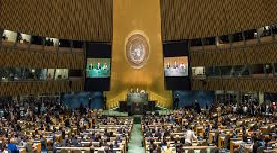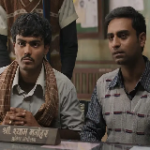Summit of the future, United nation discussed the Commodity Exchange through the World Cooperation Economic forum to restructure the global financial architecture through cooperative economic framework
The pact of the future document of the United Nation must integrate Buddha’s teachings of compassion, understanding, and non-violence, which are essential principles for building trust and cooperation among nations to reduce the trust deficit .
New York, In the very first interactive Dialogue ,chaired by Prime Minister of Nepal KP Sharma Oli and participated by World Bank President ,Ajay Banga , International Monetary Fund , Managing Director ,Ms. Kristalina Georgieva and the host of global leaders , at the famous trusteeship council hall in the headquarters of United nations at the Summit of the future , Secretary general of CNRI, Binod Anand gave a clarion call to have an INTERDISCIPLINARY AND MULTISECTORAL approach to reorient global governance policies . As a founder Executive president of the World cooperative economic forum which was announced in the same hall during High level political forum of SDG , Binod suggested to in a G-local way and to recreate a Network of Commodity exchanges in the Nation States especially in the southern part of the globe in a Cooperative way ( Coop- Eco- Framework) . Creating Cooperative Economic Zones in collaboration is another idea through the involvement of the public and private sector, together to make a robust Value chain. The financial sector, academia, other international and regional organizations, other relevant stakeholders, Study Centres Consortium may jointly create this framework to create millions of in situ employment to take the pact of the future and its benefit at ground level, said Binod Anand.
Global institutions like World Bank and IMF must adjust to their policies to create Cooperative led conducive and agile regulatory frameworks and enabling business environments through necessary structural reform, good regulatory practices to deepen the economic and technical cooperation, exchange of experiences and best practices to achieve sustainable and inclusive growth. Enabling the environment through a cooperative Economic framework will create a robust and quality infrastructure, financing and investment which will further leverage science, technology, innovation and digitalization.
Moreover, the changing geopolitical order with India repositioned as global leader in the multilateral platform, the Business must grow with a more decentralized approach. The Indian Cooperative economic framework will suggest ways and means to reduce inequality and to bring peace among communities, locally, nationally and of course globally. It would not get done by corporate vision alone; partnerships between the cooperative organization and public and private sector are a key step toward ensuring a sustainable, win-win economic environment for all.
CNRI with the recent Asia Pacific conference in McleodGanj has brought Buddha’s teachings as a solution to trust deficit among nations and further emphasized in the presence of global leaders for the Buddha’s way of compassion, understanding, and non-violence, which are essential principles for building trust and cooperation among nations. By promoting these values, countries can work together to address global challenges such as climate change, poverty, and inequality. The cooperative economic framework also involves creating fair trade practices, reducing economic disparities, and ensuring that the benefits of globalization are shared equitably among all nations.
About Confederation of NGOs of Rural India (CNRI)
The Confederation of NGOs of Rural India (CNRI), established in 2005 by the Ministry of Rural Development (MORD), is a pivotal organization dedicated to the socio-economic transformation of rural India with special Consultative Status in ECOSOC, United Nation.
For any query _Binod Anand ( binodanand@gmail.com) +919767561212 ( Whats App)



